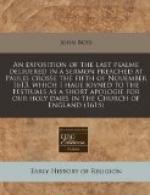teachers vnto the ceremonies of the Iewes, as concerning
the Sabbaths & the new Moones, and the like, the which
were figures of Christ and had their end in him.[cr]
Are yee so foolish, that hauing begun in the spirit,
yee would now be made perfit by the flesh? As for
Idolatricall obseruing of times, it is granted
easily that the
Pagans (in dedicating feasts
vnto false gods, and in making [cs]differences of
daies dismall and fortunate, either by curious arts,
or by particular fansies, or popular obseruations)
are worthily reputed superstitious. And the [ct]_Papists_
also (solemnizing holie daies of the Saints in their
Churches with idolatrous worshipping of the creatures,
and their Images: and out of their Churches with
Epicurelike belly-cheere, reuelling, & idlenesse)
turn againe to the beggarly rudiments and fashions
of the world: But the festiuals of England
(celebrated according to the doctrine and Iniunctions
of our Church) are verie farre from these and all
other kindes of superstition. [cu]For then is God
truly worshipped in the publike congregation, I say
the true God is truly praised in his true Saints;
on our holie daies the sacraments are rightly ministred,
the Scriptures are fruitfully read, the Word is faithfully
preached; all which are maine meanes to withdraw men
not only from superstition and idolatrie, but also
from all sortes of error and impietie whatsoeuer.
[Sidenote cm: Philip 2. 15.]
[Sidenote cn: Dan. 12. 3.]
[Sidenote co: Illiric. in Galat.
4.]
[Sidenote cp: See Sir Christop.
Heydons answer to Mr. Chambers,
pag. 368. and how the fathers answere
this. Bellarmin. de sanct.
Cultu, cap. 10.]
[Sidenote cq: English glosse.]
[Sidenote cr: Galat. 3. 3.]
[Sidenote cs: See Ambrose in Galat.
4. & August. epist. 119.
cap. 7.]
[Sidenote ct: Dr. Fulke in Galat.
4. 10.]
[Sidenote cu: See Dr. Whitgifts
defence of his answere to the
admonit. fol. 538. 539.]
Yea, but the words of the Commandement are, sixe
daies shalt thou labour: Ergo, there
should be no holie day besides the Lords day. [cx]Protestant
Diuines answere that the clause (sixe daies shalt
thou labour) is a permission, or a remission of
Gods right, who might chalenge to himselfe all our
time for his worke, and not a restraint for any man
from seruing of God on any day. For the Iewes
beside the Sabbath had diuers other feasts; as Easter,
the feast of vnleauened bread, the feast
of first fruits, Whitsuntide, the feast
of blowing Trumpets, the feast of Tabernacles;
all which (as we reade Leuiticus 23) they kept by
Gods appointment holie, notwithstanding these words
of the law, sixe daies shalt thou labour.
And so the Christian Church in all ages hath vpon




